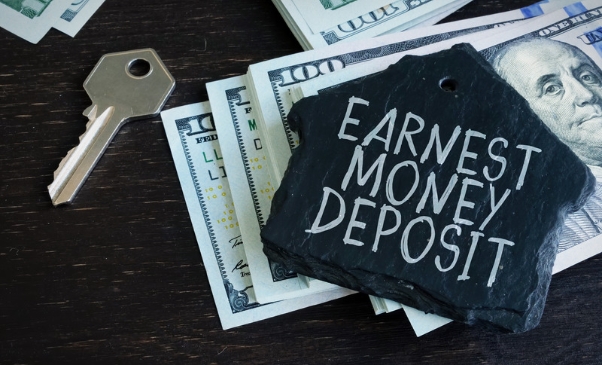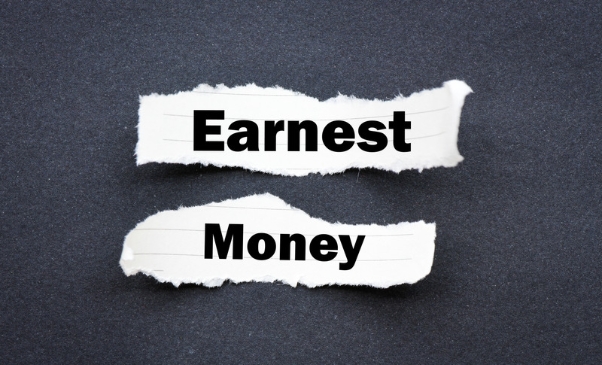The person who wants to buy a house should be ready to give the seller a deposit. When you put down a deposit of this size, If you show the seller that you want to do business with them, they will know you are serious. If the deal falls through, the buyer is entitled to get part of the purchase price that can't be changed and was used as a deposit back.
Earnest money is a deposit the buyer gives to the seller to show that they are serious about the deal and will follow through with it. Because of this, the seller can be sure that they will find a buyer for their home and that none of the potential buyers will back out at the last minute. So they can feel better about things. If you're considering buying a house, you should find out how the earnest money process works.

What Is Earnest Money?
The first money deposit also called the "earnest money deposit," shows the seller that you are serious about going through with the deal, like buying a house. You can use a regular check, a cashier's check, or a wire transfer to make this deposit. Cash buyers have more time to get financing, check the title, get an appraisal, and complete other inspections. Earnest money is put aside as a sign of good faith, an escrow deposit, or a down payment on a house.
When Is Earnest Money Required?
For the same reason, the seller may ask the buyer to put down a deposit called "earnest money" when buying a house. This is usually done with a money order or cashier's check, which are non-refundable. Buyers must include a down payment and earnest money deposit with their house offer. Even though there are no rules about how much the earnest money deposit has to be, it is usually between 1% and 2% of the home's total price.
How to Protect Your Earnest Money?
Before accepting your offer on the home, the seller will usually need a good faith deposit. If you decide to back out, you might lose the earnest money. Still, you can do a few things to keep yourself safe from possible danger. You first need to ensure that the contract makes it clear that the earnest money is non-refundable.
If the seller backs out, you won't lose any money. Ensure that the agreement says the earnest money will be put into an escrow account. It means that the money will be held in escrow by a third party until either the transaction is completed or it is cancelled. This will protect your money in case the vendor can't be found or goes bankrupt.
What Happens if the Deal Falls Through?
By doing this, they can get back some of the costs associated with getting a new customer. This could happen if, for example, the buyer can't get a loan or the home inspection shows that the property has major problems. To lower the overall risk level, you must fully understand the terms of the real estate contract. You must have a plan in case something goes wrong and meet all of the agreement's deadlines, such as those for passing inspections and receiving payment.
Also, you need to ensure you have a detailed plan B and a plan B. Ensure that the contract spells out not only the basic requirements but any other requirements you may have.
Why Earnest Money Makes Sense for Buyers and Sellers
Before offering a house, all potential buyers must hand over a down payment, which is also called "earnest money." Putting down a deposit shows the seller that you are serious about buying their property and can follow through. You probably won't be able to get out of the contract at the last minute because you will have to give up the earnest money you have already paid.
The down payment that the buyer makes acts as a kind of insurance for the seller, protecting them from the risk of losing money if the seller breaks the terms of the contract. In other words, the payment of earnest money lets both parties know that there are real risks involved in doing business with each other. This serves as a warning to both parties.

What Are Some of the Common Amounts for Earnest Money?
There's a chance that the usual terms for an earnest money deposit might get your attention. Most of the time, a deposit is between 1% and 5% of the item's total price. You and the seller can talk about a fair price, and it's up to you and the seller to come to a deal that works for both of you.
Think about how much the house is worth now so that you can make an offer that is good for you and the seller. You should consider the information in this paragraph when deciding how much earnest money deposit to send with your offer. Keep in mind that the seller and the seller's agent will take you more seriously as a buyer if you put down a bigger deposit.
Conclusion
When you make an offer on the house, you will almost always have to put down an "earnest money deposit." This is money that can't be taken back. When a potential buyer gives the seller an earnest money deposit, it shows that they are serious about buying the property for sale. The down payment is put into an escrow account, and it won't count toward the price of the house until the closing.